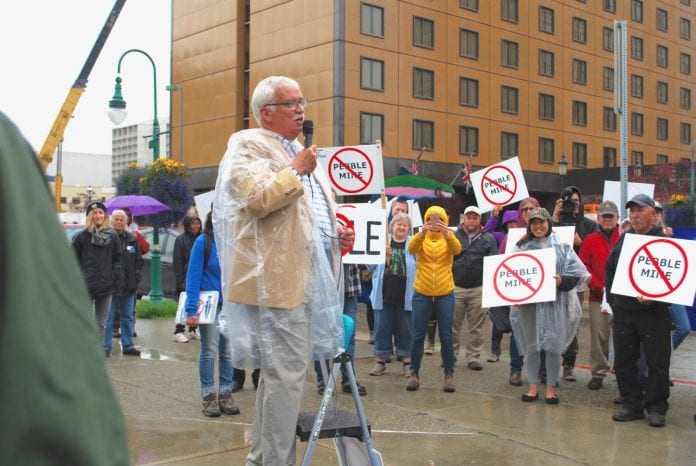
Justices of the U.S. Supreme Court last week rejected, without comment, a state of Alaska challenge to the Environmental Protection Agency (EPA) Clean Water Act veto of the proposed Pebble Mine, on land abutting the Bristol Bay watershed in Southwest Alaska.
Alaska Attorney General Treg Taylor had filed the complaint in July, contending that the EPA was intruding on the state’s sovereignty, and that the EPA’s veto of a water quality permit constituted an illegal taking of state property. State officials have continued to argue their mineral rights to wetlands that the state was granted by the federal government when Alaska became a state and also as part of an amendment of the Alaska Native Claims Settlement Act.
Taylor said the EPA set a dangerous precedent when it issued a preliminary veto of a project on state land.
“I swore an oath to uphold Alaska’s Constitution, which requires developing and conserving all of Alaska’s natural resources for the maximum benefit of its people,” Taylor said. “Due to the national significance of the EPA’s veto, we went to the Supreme Court directly asking it to take up this case so the issue can be resolved as quickly as possible. While SCOTUS did not pick up the case at this time, it does not indicate how the Supreme Court will ultimately rule on the merits. All this decision means is that we will take the more traditional route and file first in the federal district court. We will continue fighting for Alaska’s right to develop its resources through the federal court system.”
Meanwhile in Dillingham, commercial harvesters and other opponents of the proposed massive copper, gold and molybdenum mine expressed relief over the decision of the nation’s highest court.
Nels Ure, a Bristol Bay commercial harvester and communications director of Commercial Fishermen for Bristol Bay, said the EPA’s decision was in alignment with the people of Bristol Bay, the majority of Alaskans, thousands of commercial fishermen, and other Americans “who know Bristol Bay’s wild salmon are more important than the interests of a foreign mining company.”
“It is clear that legislation that permanently protects Bristol Bay is necessary to ensure that we are not forced to fight this existential threat decade after decade,” Ure said.
“While we are relieved and happy to see the Supreme Court discuss Governor Dunleavy’s unreasoned attempt to challenge the EPA’s Clean Water Act veto of the Pebble Mine, as an Alaskan fisherman I am concerned about the amount of public money that was wasted to push this frivolous case,” said Mark Niver, another commercial fisherman and board member of the Bristol Bay Regional Seafood Development Association.
“We need our elected officials to work with us to pass legislation to permanently protect Bristol Bay and all that the watershed supports in order to end the uncertainty that’s loomed over us for decades,” Niver said.
“EPA’s decision to protect Bristol Bay from the proposed Pebble Mine is grounded in decades of science, public support, and legal authority,” said Jason Metrokin, president and CEO of the Bristol Bay Native Corporation. Still, Metrokin acknowledged remaining uncertainty about the future of the watershed, where millions of salmon return each year to spawn in river systems connected to the watershed.
“Our elected officials should listen to the majority of Alaskans who want to see Bristol Bay protected and work on legislation for the region,” he said.
Rep. Rick Larsen, D-Wash., called the Supreme Court’s decision great news for Bristol Bay, “one of the nation’s most pristine natural areas and the world’s largest salmon fishery.”
“It will allow the Pacific Northwest, Alaska, and its Indigenous communities—including the Yup’ik, Dena’ina, and Alutiiq peoples—to continue to rely on this pristine area of cultural and economic significance,” he said in a statement issued Tuesday.
The court’s rejection of the state’s plea means that the Dunleavy administration will have to file a lawsuit in a lower federal court and follow the regular route for its pursuit of the mine, a path that will take time and money, noted veteran investigative journalist Dermot Cole of Fairbanks in a commentary Tuesday on the state’s litigation.
While Cole’s column did not state how much the state paid the law firm of Consovoy McCarthy PLLC for this litigation, it noted that top lawyers there charge $600 an hour, and that Consovoy McCarthy has collected millions of dollars from the Dunleavy administration since 2019.
The Pebble case is one of two that the law firm had before the U.S. Supreme Court for the Dunleavy administration. The second is an appeal of the Dunleavy administration’s anti-union crusade that began under former Attorney General Kevin Clarkson in 2019, who resigned on Aug. 25, 2020. Clarkson had been placed on administrative leave after a junior state employee filed a complaint saying Clarkson has sent about 558 text messages to her and asked the woman to come to his home at least 18 times.
Cole said the Supreme court might decide next week whether the anti-union case will be heard.














